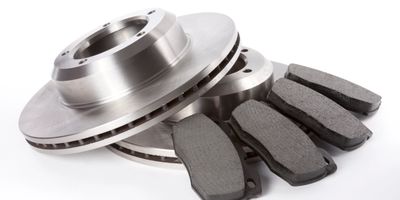14 DONKIN RD, ARMSTRONG, WASHINGTON, NE37 1PF | 0191 338 5383
Brakes - what can we do?

Brake inspections & safety checks – full visual and mechanical inspection.
Did you know? Regular inspections can spot wear before it affects stopping power, often saving the cost of major repairs.
Brake pad replacement – high-quality pads fitted for safe, quiet stopping.
Value add: We fit high-quality pads matched to your vehicle for smoother braking and longer life.
Brake disc (rotor) replacement.
Did you know? Warped or scored discs can cause steering vibration and longer stopping distances replacing them restores smooth, safe braking.
Brake shoe & drum replacement – for vehicles with drum brakes on rear wheels.
Tip: Rear drum brakes may last longer than discs, but when they wear they can reduce handbrake strength and overall braking balance.

Brake fluid change & system flush – essential every 2 years to maintain hydraulic efficiency.
Did you know? Brake fluid absorbs moisture over time, lowering boiling point and risking brake fade. UK garages recommend changing every 2 years. Brake fluid is classed as "Hydroscopic".
ABS (Anti-lock Braking System) diagnostics & repairs – sensor checks, module testing and repairs.
Value add: A healthy ABS prevents wheel lock-up and maintains steering control during sudden stops, especially in wet weather.
Electronic parking brake servicing & repairs – including reset and recalibration.
Did you know? Modern electronic handbrakes need periodic calibration to prevent uneven wear or unexpected warning lights.
Calliper servicing & replacement – freeing off seized callipers and fitting replacements if required
Tip: Seized callipers can cause uneven pad wear and pulling to one side. Servicing or replacing them keeps braking smooth and balanced.

Brake hose & hydraulic line replacement – to prevent leaks and maintain pressure.
Did you know? Rubber brake hoses can crack from age and road salt. Replacing them prevents leaks and sudden loss of pressure.
Brake master cylinder repairs & Servo Repairs – replacing worn seals or faulty units.
Value add: The master cylinder generates the pressure your brakes need - replacing worn seals avoids spongy pedal feel.
Handbrake/parking brake adjustments & cable replacement – for strong, balanced hold on slopes.
Tip: A properly adjusted handbrake gives firm hold on hills and helps pass the M.O.T handbrake efficiency test.
Brake light switch and warning light diagnostics – solving dashboard alerts and electrical faults.
Did you know? A faulty switch can cause brake lights to fail - an M.O.T failure point and a safety risk.

Performance brake upgrade – fit uprated discs, pads or braided hoses for improved stopping power.
Value add: Upgraded discs, pads or braided hoses improve stopping power and resist fade on high-performance or towing vehicles.
Emergency brake repairs – same-day service for urgent safety issues.
Did you know? We prioritise urgent safety repairs - often same day - to get you back on the road quickly and safely.
Got a Question About Brakes?
Please reach us at craggsrecovery@gmail.com or give us a call 01913385383 if you cannot find an answer to your question.
We recommend a brake inspection at least once a year or every 12,000 miles, and immediately if you notice squeaks, grinding, or a spongy pedal. Ideally your vehicle gets serviced annually therefore brakes will be getting checked routinely.
Brake pads typically last 20,000–40,000 miles, while discs may last up to 60,000 miles. Driving style, vehicle weight, and road conditions all affect lifespan.
Squealing, grinding, longer stopping distances, a pulsing brake pedal, or your car pulling to one side are all signs your brakes need attention.
Air in the brake lines, low fluid, or a master cylinder fault can cause this. It should be inspected immediately for safety.
At least every 2 years. Brake fluid absorbs moisture over time, lowering its boiling point and risking brake fade.
The Anti-lock Braking System prevents wheel lock-up in hard stops, helping maintain steering control—especially in wet or icy conditions.
You’ll still have standard braking, but the anti-lock function may not work. We recommend a diagnostic check as soon as possible.
Most cars use disc brakes on the front for stronger stopping power and drum brakes on the rear for stability and parking brake support. This isn't always the case. Some cars do have discs all around. You may find a Fiesta-sized car or small car will have drums on the back whereas larger cars tend to have discs all around for increased stopping power.
Pads should always be replaced in axle pairs (both fronts or both rears) to keep braking balanced and safe. Discs are also replaced in axle pairs.
Drive smoothly, avoid heavy braking where possible, and have regular brake checks to catch small issues early.
Many modern cars use an electric switch instead of a manual lever. These systems still need periodic checks and calibration to avoid sticking or uneven wear.
Yes. We explain exactly what needs doing, why, and how soon, so you can make an informed decision.